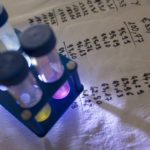bioRxiv. 2021.07.16.452741
To design appropriate treatments, one must be able to characterize accurately the response of bacteria to antibiotics. When exposed to β-lactam treatments, bacteria can be resistant and/or tolerant, and populations can exhibit resilience. Disentangling these phenomena is challenging and no consolidated understanding has been proposed so far. Because these responses involve processes happening at several levels, including the molecular level (e.g. antibiotic degradation), the cell physiology level (filamentation) and the population level (release of β-lactamases into the environment), quantitative modelling approaches are needed. Here, we propose a model of bacterial response to β-lactam treatments that accounts for bacterial resistance, tolerance, and population resilience. Our model can be calibrated solely based on optical density readouts, can predict the inoculum effect, and leads to a mechanistically relevant classification of bacterial response to treatments that goes beyond the classical susceptible / intermediate / resistant classification. Filamentation-mediated tolerance and collective enzyme-mediated antibiotic degradation are essential model features to explain the complex observed response of cell populations to antibiotic treatments.




